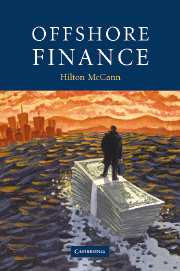Book contents
- Frontmatter
- Contents
- List of figures
- List of tables
- Preface
- List of abbreviations
- PART I The past
- PART II The present
- PART III The future
- 13 Some problems ‘Offshore’
- 14 Some problems ‘Onshore’
- 15 Small islands and ‘Offshore’
- 16 Some information on particular centres
- 17 The UK and ‘Offshore’
- 18 The USA and ‘Offshore’
- 19 Can the problems be identified?
- 20 Offshore's Future
- 21 How to assess an ‘Offshore Finance Centre’
- 22 Conclusion
- Appendix 1
- Appendix 2
- Index
21 - How to assess an ‘Offshore Finance Centre’
from PART III - The future
Published online by Cambridge University Press: 21 August 2009
- Frontmatter
- Contents
- List of figures
- List of tables
- Preface
- List of abbreviations
- PART I The past
- PART II The present
- PART III The future
- 13 Some problems ‘Offshore’
- 14 Some problems ‘Onshore’
- 15 Small islands and ‘Offshore’
- 16 Some information on particular centres
- 17 The UK and ‘Offshore’
- 18 The USA and ‘Offshore’
- 19 Can the problems be identified?
- 20 Offshore's Future
- 21 How to assess an ‘Offshore Finance Centre’
- 22 Conclusion
- Appendix 1
- Appendix 2
- Index
Summary
Morality in the marketplace depends on the decisions made by each individual economic agent … [E]conomic success depends upon morality.
Introduction
This chapter highlights some information that might be relevant to anyone who might be anticipating using an ‘Offshore Finance Centre’ or who already uses an OFC but who wants some objective criteria by which to assess it. The criteria that follow are merely indications. It is most unlikely that anyone will go to the extent of collating all the information that follows. (Even financial services companies anticipating establishing a presence are unlikely to go to these lengths.) However, the extent of the criteria listed indicates that there may be a lot more information available than most people realise.
The significance of reputation
Generally speaking, two reasons are usually cited to explain why ‘Offshore Finance Centres’ attract so much business. First, it is said that there is likely to be no tax or, if there is tax, it will probably be at a nominal rate. Secondly, it is said that there will be no effective regulation. By extension, the latter are often offered as the reasons why the world's tax evaders and money launderers use such OFCs – because it is said that anything is possible in such places. The extent to which the public's perception has been influenced by fiction (like The Firm, by John Grisham) or by fact (like the arrest of the Chairman of Vanuatu's Financial Services Commission on charges of laundering US $14 million from the island's shipping registry) remains to be seen.
- Type
- Chapter
- Information
- Offshore Finance , pp. 465 - 478Publisher: Cambridge University PressPrint publication year: 2006



